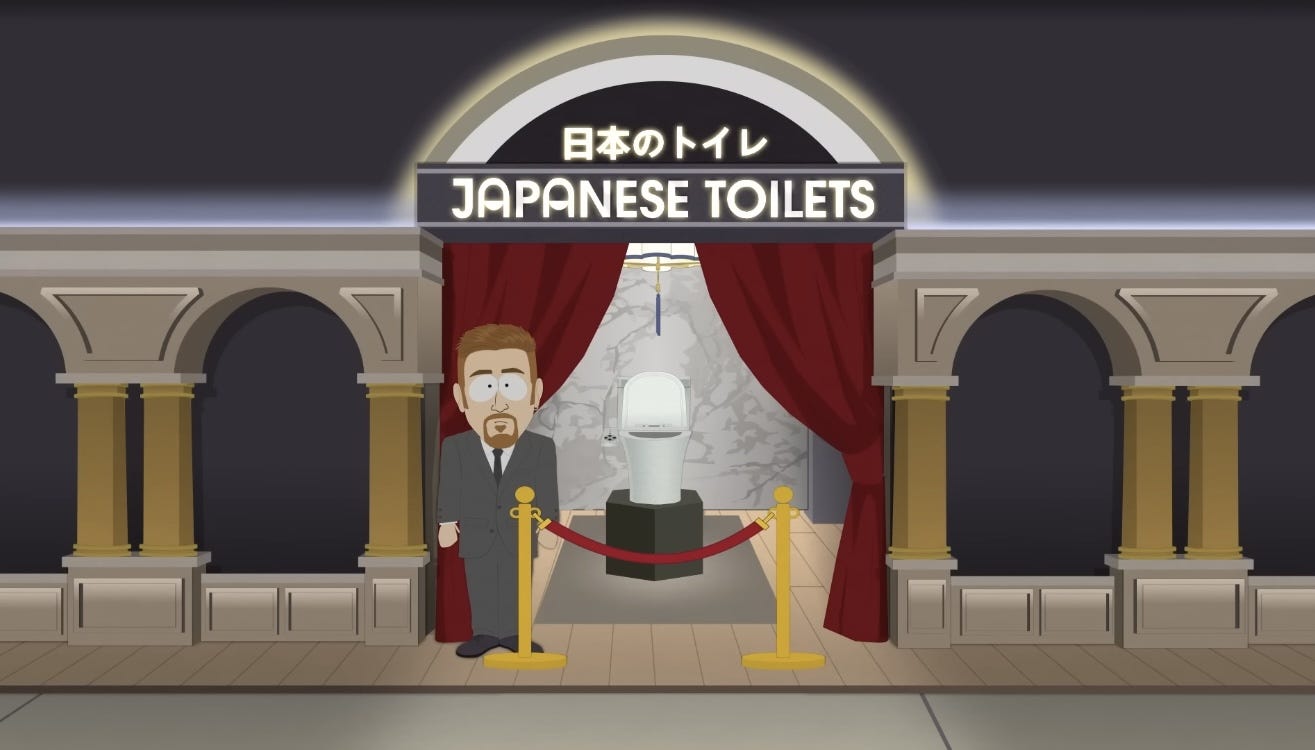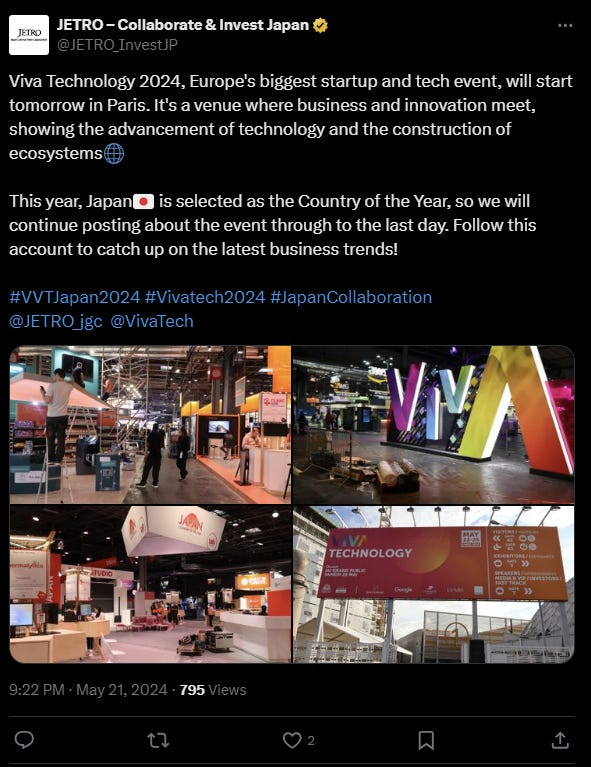Temasek sets up shop, Bain literally doubles down, and Carlye launches its largest Japan buyout fund
Private capital power players making a beeline to Japan
Fun fact of the week:
The Neorest® NX2 Dual Flush (MSRP: $21,181) is the most expensive toilet in Japan, which means that it’s probably the most expensive toilet in the world.
As any visitor to Japan can attest to, the bathroom experience in Japan is easily world-leading: integrated bidet functions, minutely-controllable heated seats, built-in night lights, and automatic self-deodorizing systems galore!
Whether you view these as incredible wonders of technology or horribly overengineered solutions in the Sisyphean pursuit of perfection, Toto and Lixil - Japan’s leading manufacturers in the space - dominate the high-end smart toilet market. Toto alone commands approximately 60% of global market share with net sales exceeding ¥700B JPY in 2022.
Which brings us to a slightly more serious point of inquiry: why has this feature rich, high-price point, and engineering-first approach to product development worked out for smart toilets, but failed Japanese firms in other categories such as TVs, smartphones, and PCs over the last two decades?
On a side note: At least one venture capitalist has expressed interest in building a team of crack toilet engineering experts to build a startup in the space.
And with that, we leave you with the news of the week!
The Headlines
Shift in Hiring Trends: Japanese Banks Embrace Midcareer Hires
Close to 1,100 Tokyo Prime Companies Plan to Cut Cross-Held Shares
Temasek's Venture Capital Unit Debuts Japan-Specific Investment Fund
Carlyle Group raises $2.8B in largest Japan-focused buyout fund
Deep Dives
Shift in Hiring Trends: Japanese Banks Embrace Midcareer Hires
Japan's three leading banks (MUFG Bank, Sumitomo Mitsui Banking Corp. (SMBC), and Mizuho Financial Group) are planning to increase their hiring of midcareer workers this fiscal year to 45% of all hires, marking a sea change from the traditional practice of hiring new graduates and training them as generalists. This tracks with a broader shift in Japanese hiring practices, with 37.6% of all hires this fiscal year expected to come from experienced professionals.
We’ve talked about traditional hiring practices in Japan in a previous post here, but this could be finally (and rapidly) changing. The broader impact of this shift can’t overstated - alongside this comes the possibility of rising wages, greater labor specialization, less insular corporate culture, and more entrepreneurialism as leaving jobs becomes less risky.
Overall Hiring Statistics:
Midcareer hires at these banks have increased significantly from just 5% in fiscal 2018 to 45% in fiscal 2024
Shift in Hiring Practices:
The traditional practice of hiring hundreds of new graduates each year has shifted due to the increasing demand for workers with immediate expertise in areas such as digital technology, wealth management, and project finance
The banks scaled back hiring new graduates during Japan's negative interest rates experiment, with total new graduate hires dropping from over 5,000 in fiscal 2015 to just over 1,000 at one point
Labor Market Dynamics:
The liquidity in Japan's labor market has grown, with more workers moving to competing employers or different fields entirely
Consulting firms and trading houses are attracting promising candidates with generous compensation
Banks are increasingly relying on referrals from current employees and alumni to find candidates, avoiding the steep fees associated with staffing agencies
Close to 1,100 Tokyo Prime Companies Plan to Cut Cross-Held Shares
Much awaited corporate governance reform continues Nearly 70% of companies listed on the Tokyo Stock Exchange's Prime market plan to reduce their cross-held shares.
What are cross-held shares?
Cross-held shares, or strategically held shares, are mutual equity holdings between companies to solidify business relationships.
These shares create a network of stable shareholders, reducing market pressure and potentially leading to lax corporate discipline.
This shift, driven by the need for improved corporate governance and pressure from investors, marks a significant increase in commitments compared to previous years. The reduction in cross-shareholdings is seen as a move to enhance market discipline and capital efficiency among Japanese corporations.
Company Examples:
NTT, Japan's largest telecommunications group, plans to avoid holding shares for creating stable shareholders.
Itochu aims to sell investments that do not generate economic value or lack strategic objectives within two years.
About 90 companies have set specific goals for reducing cross-held shares, potentially selling off 4.7 trillion yen ($30.2 billion) worth of shares.
Increase in Commitments:
This number is 40% higher than the 793 businesses that sold cross-held shares in 2023.
What impact does this have?
Companies with more cross-held shares tend to have lower price-to-book ratios and return on equity.
Companies with PBRs below 1 own cross-held shares equivalent to 9% of net assets on average, while those with PBRs above 1 average 4% of net assets.
Temasek's Venture Capital Unit Debuts Japan-Specific Investment Fund
Vertex Holdings, the venture capital arm of Temasek Holdings, is set to expand its investment in Japanese startups with a new dedicated fund aiming to raise 10 billion yen ($65 million). This move highlights a rare foray by a leading global investor into Japan's emerging startup ecosystem. The fund will focus on early-stage companies in sectors like consumer and enterprise software, and deep tech, supported by the Japanese government's efforts to boost startup investments through policy reforms.
Investment Strategy:
Vertex Ventures Japan will invest in at least 15 early-stage companies with check sizes of 200 million yen to 500 million yen, including follow-on investments.
Vertex's Track Record:
Known for early investments in companies like Grab, Vertex has over $6 billion in assets under management and over 300 portfolio companies.
The group has minted more than 20 unicorns globally, including PatSnap and Nium.
Previous Investments and New Fund:
Vertex has fundraised from Japanese investors, including Japan Investment Corp., Sumitomo Mitsui Banking Corp., Marubeni, Development Bank of Japan, and Risa Partners.
Previously, Vertex invested in Japanese startups through its incumbent funds, such as the Tokyo-based AI startup Alt in 2022.
Bain Capital aims to double its investment in Japan
Bain Capital is set to double its investment in Japan over the next five years, reflecting the country's growing appeal to global investors amid economic reforms and a favorable business environment. With plans to build on its $5 billion investment in the past decade, Bain is poised to capitalize on Japan's low interest rates, openness to private equity, and a robust mergers and acquisitions market.
Favorable Business Environment:
Japan's low interest rates and increased openness to activist investors and private equity funds make it attractive for foreign investments. Bain's involvement in the potential buyout of Toshiba highlights this trend.
Significant Milestones:
2024 could be pivotal for Bain in Asia, with Kioxia, acquired by a Bain-led consortium, preparing for an IPO. The recovering semiconductor market and potential easing of U.S. monetary policy could further enhance the private equity landscape.
Growth in M&A Activities:
While global mergers and acquisitions value dropped 16% in 2023, Japan saw a 28% increase, indicating a robust market for private equity opportunities. Japan's market size and untapped potential make it crucial for Bain's strategy.
Diversified Investment Strategy:
Bain emphasizes a pan-Asia approach, being active in markets like India, South Korea, and Australia, while being selective about China due to geopolitical tensions. Investments in diverse sectors, including semiconductors, offer high upside opportunities despite inherent risks.
Carlyle Group raises $2.8B in largest Japan-focused buyout fund
Carlyle Group has raised 430 billion yen ($2.8 billion) for its fifth and largest Japan buyout fund, reflecting strong demand from both domestic and global investors. The fund will target leveraged buyouts and companies undergoing management transitions, selling non-core businesses, or considering privatization.
Increased Interest in Japan:
Global investor interest in Japan has increased due to a cheap yen, a buoyant public market, and policy drives to improve corporate governance.
Japan's Nikkei share average saw significant gains, up 16% this year.
Private Equity Activity:
Private equity-backed mergers and acquisitions in Japan reached a record $35.5 billion in 2023.
Carlyle has about 30 deals in its Japan pipeline and plans to add nine more staff to its 25-strong local team.
Investor Composition:
About 70% of the investors in Carlyle's new Japan fund are non-Japanese, up from 60% in the previous fund.
Historical Investments:
Carlyle's Japan buyout platform has invested more than 450 billion yen across about 40 private equity investments since 2000.
The fourth buyout fund raised 258 billion yen in 2020, delivering a 28% net IRR (internal rate of return).
Recent and Ongoing Deals:
Launched a tender offer for KFC Holdings Japan worth 135 billion yen ($863 million).
Selling Japanese cosmetics supplier Tokiwa Corp, potentially valuing the company at $800 million.
Word on the Street
Fundraising Highlights
YouTrust, a referral recruitment platform for side jobs and job changes, raised a ¥649M JPY (~$4.1M USD) Series C round led by Globis Capital Partners, and participated by Anri, Strive, Delight Ventures, Femto Partners
Kisui Tech, An agro-robot startup from Tohoku University that develops the off-road autonomous AI robot "Adam.", raised a ¥150M JPY (~$1M USD) Series A round led by Environmental Energy Investment
Roxx, a job distribution platform that connects recruiting companies and recruitment agencies, raised an undisclosed Series B round from Will Group
Helte, A startup that operates the online communication service "Sail", raised an undisclosed Series A round from Tsunagu Group Holdings
Inaho, A startup that provides agricultural harvesting robots that utilize AI, raised an undisclosed Series C round from Bando Chemistry
Chaintope, a hybrid PoA (Proof of Authority) blockchain protocol, raised an undisclosed Series B round from Japan Evolution Fund
More Food for Thought
Some additional reads from the week -
Japan can draw foreign startups by fostering community support (Nikkei Asia Review)
Sumitomo Mitsui to offer Japan's first VC investment product for Retail (Nikkei)
Japan Inc. is changing the way it assesses leadership (Nikkei Asia Review)
From Japanese knives to sake, startups open new doors for traditional crafts (Nikkei)
South Korean startups' Tokyo fever sizzles (The Korean Economic Daily)
大学発スタートアップ、阪大や北大が躍進 23年度調査 (Nikkei)
Notes from the Team
Thanks for reading and hope to see you around the sidewalks of Tokyo!
Have a question or any feedback? Let us know!
Jeremy (Investor @ GHOVC) / Kenneth (Product @ Moon Creative Lab)











